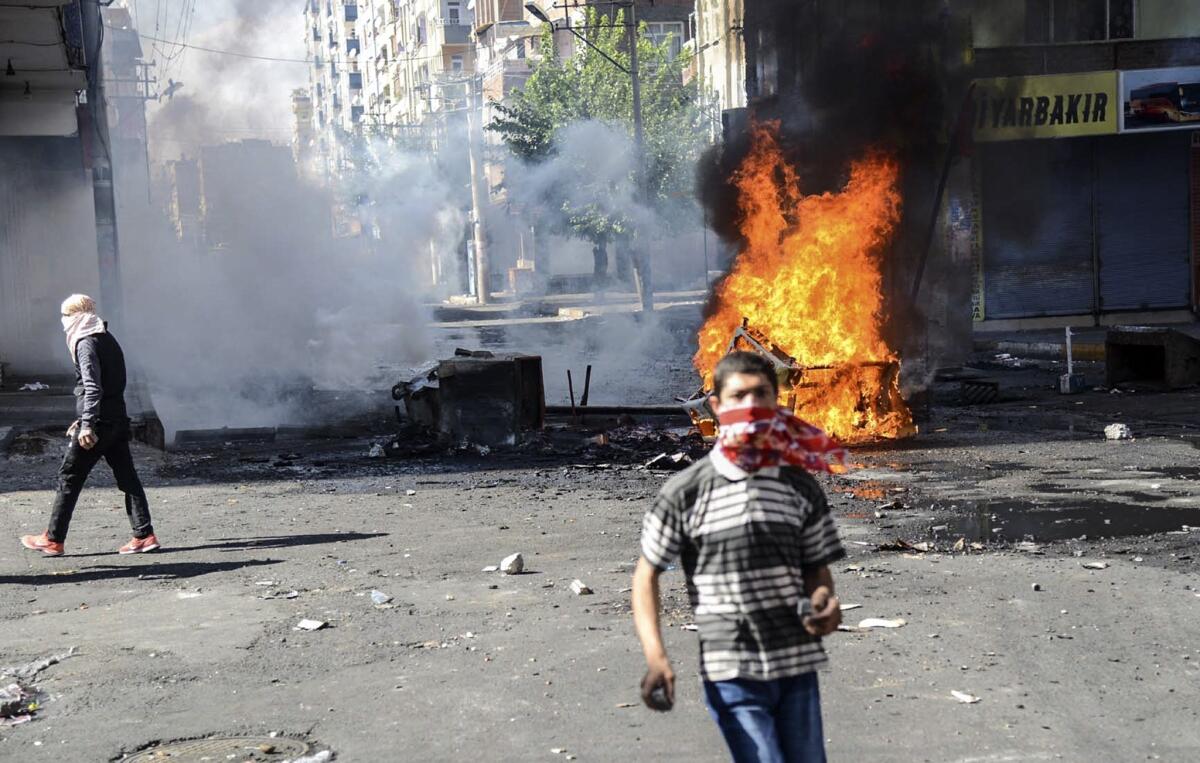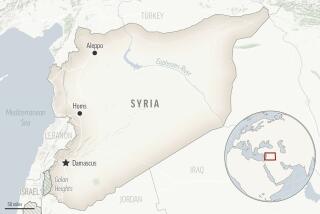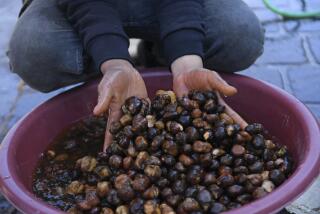Related story: In Turkey, Kurdish anger, fear grow as militants advance in Syria

Kurdish civilians in Turkey gaze skyward as warplanes rumble above the embattled city of Kobani, just across the border in Syria.
Late Wednesday afternoon, a massive explosion shakes a hilltop where, a few days ago, Islamic State militants had raised their black flag.
Cheers and applause rise from the gathered crowd.
But the elation is short-lived. Sustained blasts of gunfire ring out from the city, besieged for weeks by extremist fighters. A shroud of smoke hangs over Kobani amid periodic explosions.
“Islamic State has been using car bombs today,” said Dr. Nawaf Shahan, a Kurdish medic who recently left Kobani, a largely Kurdish city. “They are attacking the south with these bombers, trying to open the south up to their fighters.”
For a third consecutive day, the sound of what appeared to be airstrikes from a U.S.-led coalition meant to support the outgunned Kurdish militiamen and women reverberated from the Kobani area. Gun battles again flared in the city, now largely empty, most of its residents having fled to Turkey.
It was unclear Wednesday how far the militants had advanced into the city.
How long the Kurds can fend off the better armed and more numerous Islamic State fighters is a major question. They have vowed never to give up. But many Kurdish refugees fear that the Kurdish fighters cannot hold out much longer.
“We want the United Nations to come. Anyone to help us against these barbarians,” said Mohammed Bozan, 75, who left his farm outside Kobani 15 days ago. “If not, they will destroy everything,” said Bozan, speaking at a nearby refugee camp.
In Turkey, the fate of Kobani has sparked waves of protests among ethnic Kurds, a substantial minority in the country. Many Kurds accuse the government in Ankara of collusion with Islamic State, an allegation denied by Turkish President Recep Tayyip Erdogan.
Kurds are outraged that Turkish forces have not allowed reinforcements and provisions into Kobani, which is cut off from supply routes in Syria.
At least 21 people were killed in nationwide protests late Tuesday and early Wednesday, according to news reports in Turkey. Many Kurds took to the streets, lobbing Molotov cocktails and engaging in firefights with police and Islamic militants, Turkish news reports indicated.
“We don’t want Erdogan,” said 51-year-old Selim Kaya, a Turkish Kurd from the nearby town of Suruc, speaking in a field along the frontier. “He doesn’t really care about the Kurds. Like every government before, it is the same thing: denying us a Kurdish identity.”
The anger among Kurds threatens to scuttle peace talks between Ankara and its longtime nemesis, the outlawed Kurdistan Workers Party, or PKK, which seeks greater Kurdish autonomy. Turkey and the PKK have engaged in a three-decade war that has left tens of thousands dead. A year ago, there was hope for a peace deal.
Tension between the central government and Turkey’s Kurds is on the rise. The Kurdish militiamen fighting in Kobani are closely tied to the PKK, considered a terrorist group in Turkey.
More than 150,000 Kurds have fled Kobani and its environs, adding to a Syrian refugee total said to approach 1.5 million on Turkish soil. The Turkish government is struggling to cope with the influx, which has caused economic, social and political strains.
In nearby Suruc, refugees clog the streets, filling all available spaces: parking lots, construction sites.
For 13-year-old Zara Kasari, now living with his family in a gray tent, life is reduced to a daily grind.
“I am bored. There is no school and nowhere much to play,” he said, while fidgeting with prayer beads. “I just sit and go to get water.”
Some Turkish volunteers are trying to assist the swelling refugee population.
Two Turkish women from far western coastal Izmir traveled to Suruc late Tuesday, knitting hand puppets on the long drive.
They spent much of Wednesday playing with children, painting cats’ whiskers or butterflies’ wings and flowers on their faces.
“I believe that my government helped make this crisis in Kobani,” said Guygu Onay, a 24-year-old English teacher. “So this is the least we can do. Really, we are just playing with the kids, trying to make them smile.”
Johnson is a special correspondent. Times staff writer Patrick J. McDonnell in Beirut contributed to this report.
Follow @mcdneville on Twitter for news out of the Middle East
More to Read
Start your day right
Sign up for Essential California for news, features and recommendations from the L.A. Times and beyond in your inbox six days a week.
You may occasionally receive promotional content from the Los Angeles Times.






